A May 15 article in the Times, one of the United Kingdom’s biggest newspapers, described harm reduction approaches supported by student organizers as “lenient”—and juxtaposed this with recent cases of drug-related harms. What that article and much other coverage fails to emphasize is the evidence-based, life-saving work that students are doing in this area.
Of course many university students in the UK use drugs. A 2018 survey—conducted by Release, a charity focused on drugs and drug law, and the National Union of Students (NUS)—illustrated use of different illicit drugs among student respondents.
“We’re never going to prevent drug use, it’s too much fun.”
The report did not seek to measure prevalence in the general student population, and participation bias may have been a factor; 56 percent of respondents had ever used illicit drugs. But of that subset, 94 percent had used cannabis, and 67 percent MDMA, with nitrous oxide (“laughing gas”) and powder cocaine the next most common. Just under 40 percent of those who’d used drugs had used ketamine; the small but rising number of ketamine-involved deaths was the focus of the Times article.
Further work by the NUS in 2020-21 found that 30 percent of student respondents had ever used illicit drugs, with 13 percent currently using them.
“We’re never going to prevent drug use, it’s too much fun,” Niamh Eastwood, the executive director of Release, told Filter.
Acknowledging this long-proven reality means turning our focus to harm reduction.
University harm reduction activists in the UK have historically struggled to gain attention and resources. But over the last few years, there have been major positive developments.
We’ve seen student-led Students for Sensible Drug Policy (SSDP) chapters starting up on more UK campuses, and the formation of the Drug Science Student Societies Network. This has added to the momentum for wider work, including research by organizations like the Higher Education Policy Institute, pilot programs focused on reducing drug-related harms to students, and a new taskforce set up by Universities UK.
One of the biggest priorities for UK student activists over the past 10 years has been access to reagent test kits on university campuses. These tools can easily be used at home to identify the likely presence (or lack thereof) of a component in a drug sample, informing a person’s choices.
Drug checking has well established benefits. In 2020, for example, UK charity The Loop published results showing that people who brought samples to pilot drug-checking services in the cities of Bristol and Durham often made changes to their behavior based on what they learned about the contents. Over 37 percent of respondents said they were going to let other people in their networks know about it, for instance, while 28 percent said that they were now planning to take a lower dose.
“It’s not even just about testing drugs to make sure they’re okay—it opens up the conversation.”
Andy Paterson, a politics student at the University of Stirling in Scotland, is one of those who have been advocating for campus drug-checking access, in his case through his involvement in the Help Not Harm campaign.
“It’s not even just about testing drugs to make sure they’re okay,” he told Filter. “That’s definitely a part of it, and it’s a really important part, but it opens up the conversation.”
Drug checking simply gives people knowledge about what they’re planning to consume—which might lead them to choose not to consume it. But still, there is opposition. At one recent conference on student drug use in England, Paterson said, “people were saying that it was quite an extreme idea to have drug testing kits, which surprised me.”
“I’ve always seen testing as entry-level, honestly,” he continued. However, “it commits an institution to actually doing something.”
Stirling University has had EZ drug testing kits freely available on campus since late 2022—the first in Scotland, and following in the footsteps of similar efforts by student organizers to make kits available at Durham University and the University of Bristol, among others.
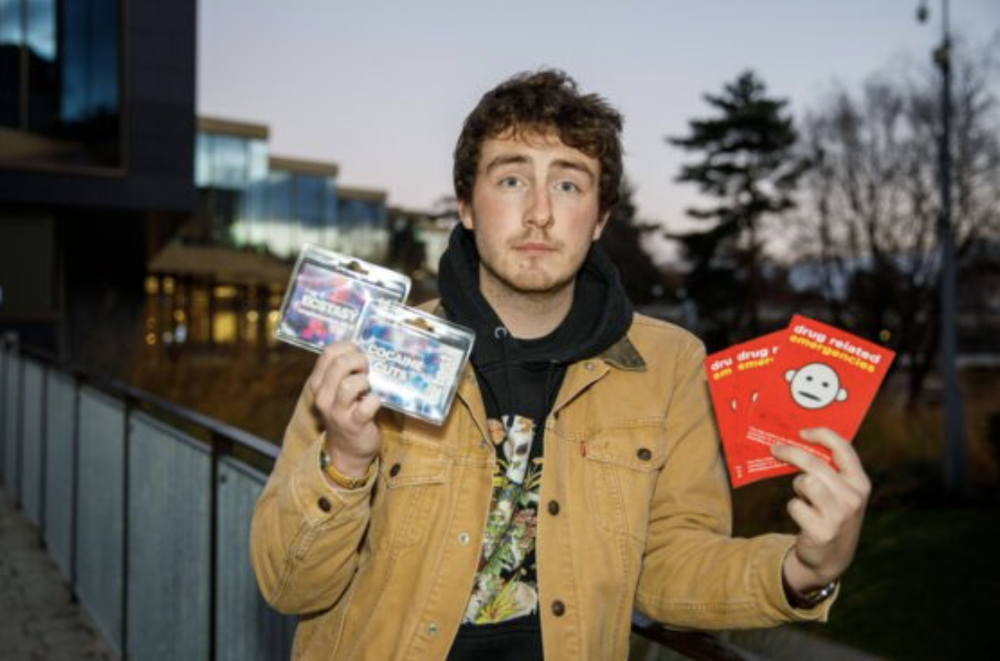
Andy Paterson holding reagent testing kits and materials; photograph courtesy of Paterson. Credit: Kenny Smith and DC Thomson.
The Help Not Harm campaign is now wider than just Stirling University, and its aims go beyond helping students while on campus. Paterson said that the crisis of drug-related deaths in Scotland has fueled its activism, and this is now reflected in its prioritization of wider harm reduction initiatives, like supporting safe consumption sites.
Drug checking is one important source of information, but broader educational initiatives about potential risks and benefits of different substances—while respecting everyone’s agency and personal choices—are also critical.
“People should be able to take whatever they want without fear of judgment, and they should be able to do so safely. It’s about giving students as much information as possible.”
“Students are going to be taking drugs anyways, regardless of if the harm reduction stuff is there or not,” Kieron Portbury, student officer of equality and diversity at Queen’s University Belfast Student Union in Northern Ireland, told Filter.
“People should be able to take whatever they want without fear of judgment,” they continued, “and they should be able to do so safely, knowing exactly what they’re taking, knowing what it’s going to do to them, and exactly how they deal with any unsafe situations that may arise. It’s about giving students as much information as possible.”
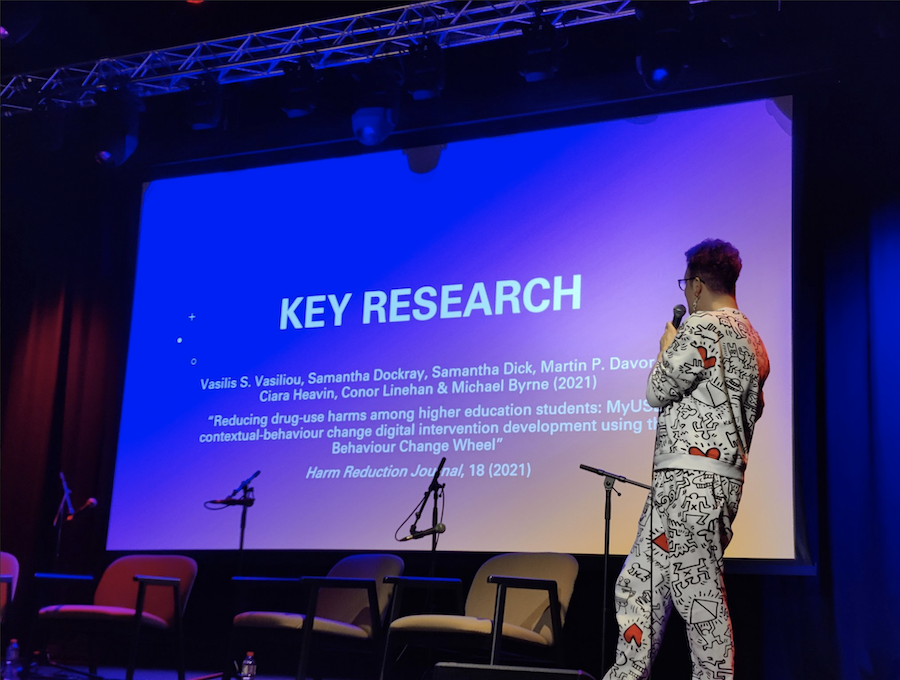
Kieron Portbury presenting at an informational event for students this year; photograph courtesy of Portbury.
So a lot of the work of UK student activists is just trying to get the message out. They want students who are using drugs to have some basic harm reduction skills in their pockets, like “start low, go slow.”
SSDP Imperial College London has done this in part by bringing harm reduction experts onto campus to speak with students directly about their expertise and experiences. AJ Martin, the chapter’s chair, told Filter that these forums foster engagement by being “not like a traditional space,” but a place where “everyone’s voice is needed, is useful and is valued.”
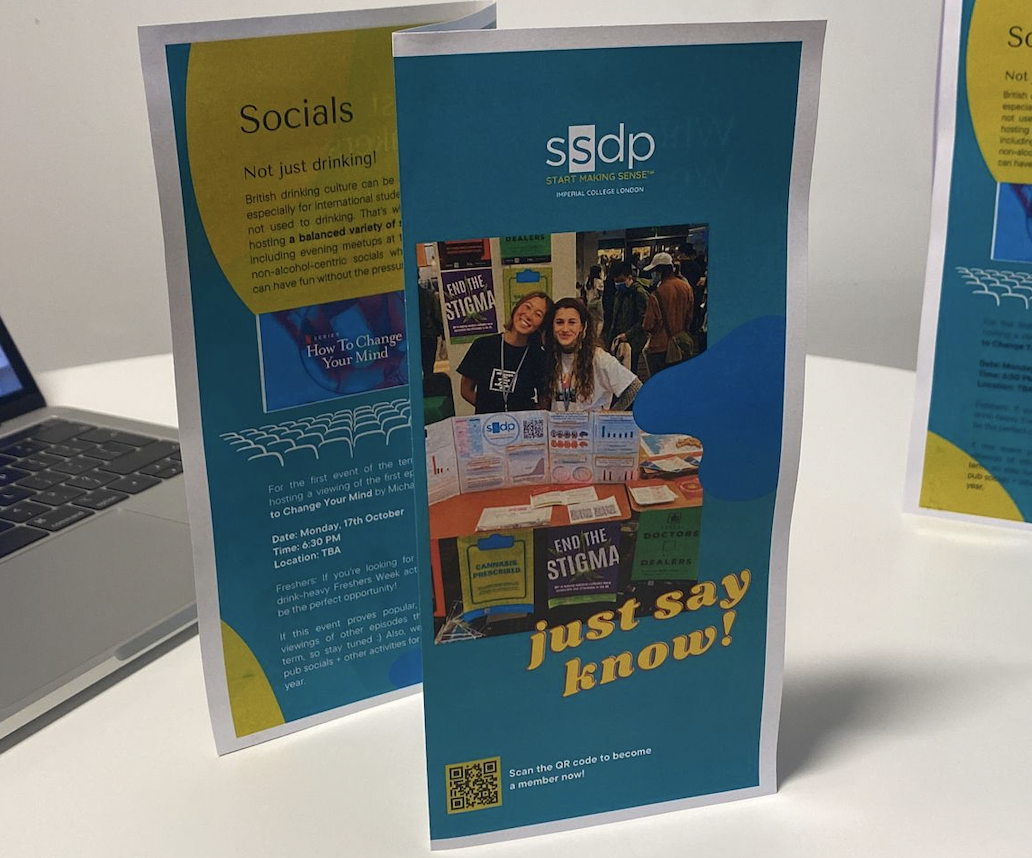
Harm reduction educational materials from SSDP’s Imperial College London chapter; photograph courtesy of AJ Martin.
Every young person has been told not to use drugs, but decades of abstinence-based approaches have not decreased drug use, and may even have increased it.
Instead, student harm reduction activists think about contextual factors that can contribute to risks—some of which are inherent to all criminalized drug use—and lead to negative outcomes. For example, Portbury talked about a potential increase in drug use among students during exam periods. This could relate to drugs that can help boost productivity, or to those that help people relax after long, stressful days. They noted that exam periods are important windows for harm reduction education.
Other students have led important efforts to fill gaps in our knowledge about drug use and inform policy. In 2021, Monica Richards, a philosophy, politics and economics student at King’s College London, founded the Benzo Research Project.
Richards and others were starting to see people using benzodiazepines in ways that were harming them, together with a lack of information and awareness. Non-prescribed benzos were also among the 10 most commonly used drugs in the Release study.
“We had so many doors shut in our faces because we were young.”
The Benzo Research Project now has over 50 volunteers in the UK and around the world, who have collected over 80 anonymous stories of non-prescribed benzo use from people aged 18-25. They published a report of their findings in December 2022, which has been distributed to policymakers, National Health Service staff and others. They also raise awareness through social media, events and general media, providing benzo facts and harm reduction education.
But many obstacles had to be overcome to get this far. “We had so many doors shut in our faces because we were young,” Joanna Bright, the project’s head of research, told Filter. Getting initial buy-in from university faculty was one of these challenges, she said, although King’s ultimately gave the project some funding. Bright hopes that in future, faculty members at universities around the country will be more willing to support student-led drug research projects.
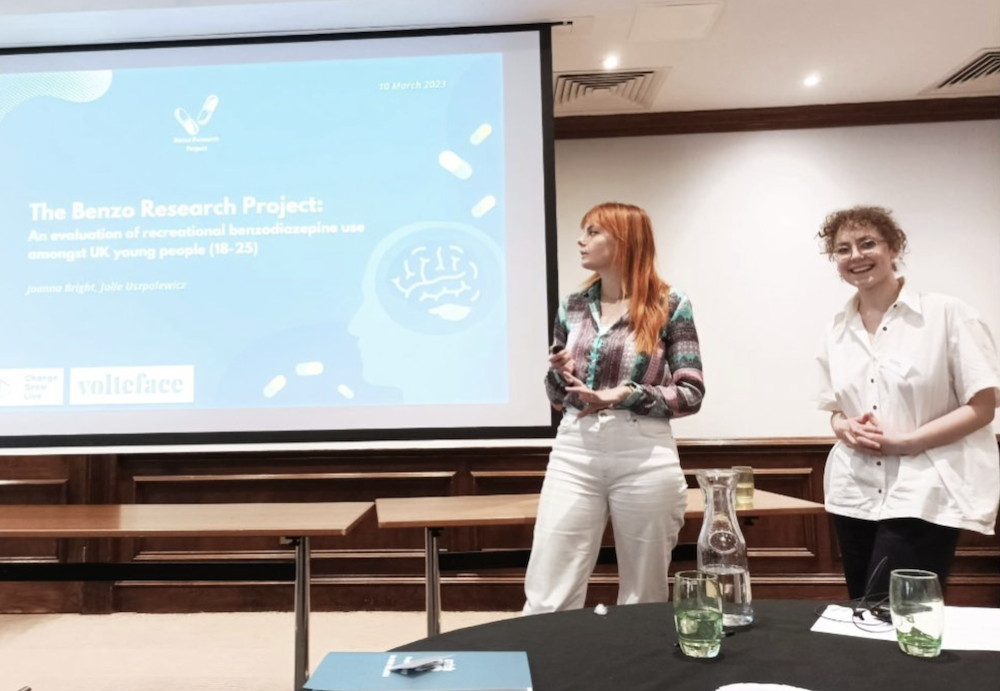
Joanna Bright (left) and Julie Uszpolewicz, research assistant for the Benzo Research Project; photograph courtesy of Bright.
Students are also working to push for policy changes, both inside and outside their institutions.
“All of the evidence shows that prohibition doesn’t work,” Bright said. “I guess we’re all coming from the place of trying to help people, but it needs to be a bit more evidence-based.”
Portbury, meanwhile, has supported their student union in drafting policies in support of harm reduction. But like many other universities in the UK, Queen’s University Belfast still has a strict no-tolerance policy for drug use—something Portbury and many others want to replace.
Presenting student-led harm reduction efforts as “leniency” is both harmful and disingenuous when reams of evidence speak for the efficacy of harm reduction education and resources in saving lives.
In contrast, UK student activists have shown incredible commitment and creativity in efforts to keep each other safe amid drug prohibition, and in working to change a harmful policy framework.
Top photograph courtesy of AJ Martin
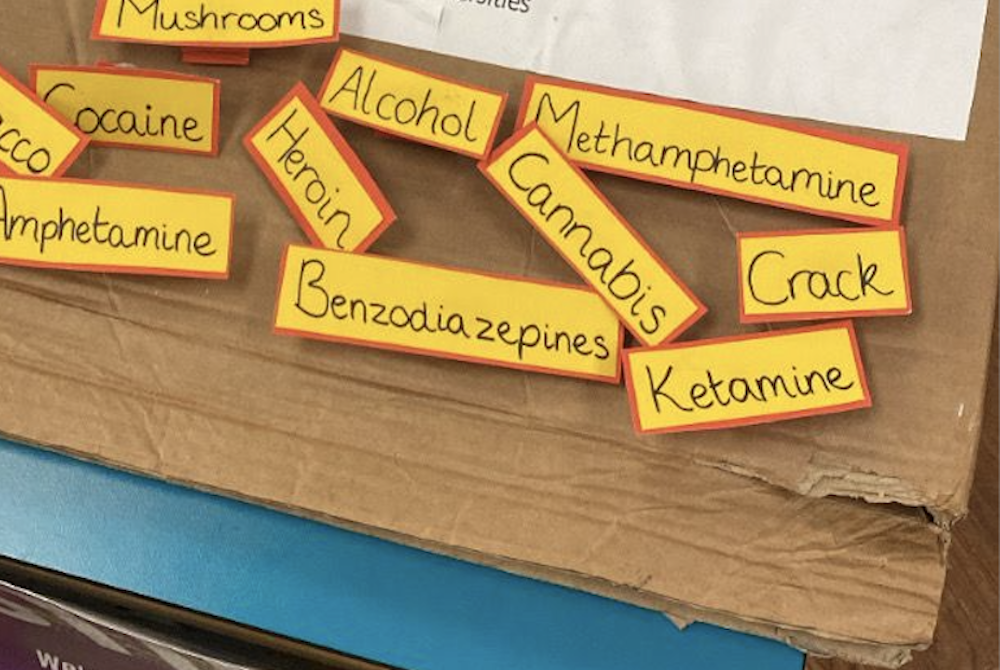





Show Comments